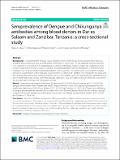| dc.contributor.author | Shauri, Haliya | |
| dc.contributor.author | Ngadaya, Esther | |
| dc.contributor.author | Senkoro, Mbazi | |
| dc.contributor.author | Buza, Joram | |
| dc.contributor.author | Mfinanga, Sayoki | |
| dc.date.accessioned | 2023-09-11T08:53:52Z | |
| dc.date.available | 2023-09-11T08:53:52Z | |
| dc.date.issued | 2021-09-06 | |
| dc.identifier.uri | https://doi.org/10.1186/s12879-021-06549-y | |
| dc.identifier.uri | https://dspace.nm-aist.ac.tz/handle/20.500.12479/1952 | |
| dc.description | This research article was published by BMC Infectious Medical in 2021 | en_US |
| dc.description.abstract | Background: The potential shift of major causes of febrile illnesses from malaria to non-malarial febrile illnesses,
including arboviral diseases such as chikungunya and dengue, is of concern. The last outbreaks of these infections
were reported in 2018 and 2019 for chikungunya in Zanzibar and dengue in Dar es Salaam. We conducted a cross-
sectional study that involved serological testing of stored blood samples from the blood banks in Temeke Referral
Hospital in Dar es Salaam and the National Blood Bank Unit in Zanzibar. The samples were collected from Zanzibar
and Dar es Salaam donors in May and June 2020, respectively. A total of 281 samples were included in the study, and
their demographic information extracted from the registers. The samples were then transported to Muhimbili Univer-
sity of Health and Allied Sciences at the Microbiology Laboratory. They were subjected to an indirect ELISA to detect
IgG and IgM against dengue and chikungunya viruses.
Results: Seropositive IgM samples from Dar es Salaam were 3/101 (2.97%) for chikungunya and 1/101 (0.9%) for
dengue, while samples from Zanzibar were all IgM negative for both viruses. Chikungunya IgG seropositivity was
significantly higher (p ≤ 0.05) in Dar es Salaam 21/101 (21.2%) than Zanzibar 22/180 (12.2%). There was no difference
in dengue IgG seropositivity between Dar es Salaam 44/101 (43.5%) and Zanzibar 68/180 (37.8%). Similarly, dual IgG
seropositivity for both dengue and chikungunya viruses were not different between Dar es Salaam 13/101 (12.9%)
and Zanzibar 11/180 (6.1%).
Conclusion: Detection of IgM for dengue and chikungunya in Dar es Salaam indicates recent or ongoing transmis-
sion of the two viruses in the absence of a reported outbreak. These findings suggest the possibility of transmission of
the two infections through blood transfusion. Detection of IgG antibodies for dengue and chikungunya viruses might
be contributed by both; the ongoing infections and residual responses caused by preceding infections in the country.
Results from blood banks may represent the tip of the iceberg. Further studies are needed to gain insight into the
actual burden of the two diseases in Tanzania. | en_US |
| dc.language.iso | en | en_US |
| dc.publisher | BMC Infectious Medical | en_US |
| dc.subject | Dengue | en_US |
| dc.subject | Seroprevalence | en_US |
| dc.subject | Viruses | en_US |
| dc.title | Shauri et al. BMC Infect Dis (2021) 21:911 https://doi.org/10.1186/s12879-021-06549-y RESEARCH Seroprevalence of Dengue and Chikungunya antibodies among blood donors in Dar es Salaam and Zanzibar, Tanzania: a cross-sectional study | en_US |
| dc.type | Article | en_US |

